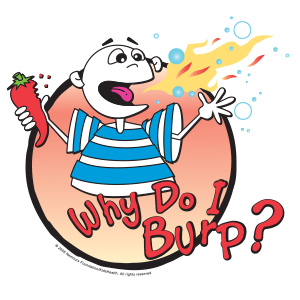- Home
- Humana Medicaid
- Kentucky Medicaid
- Medicaid extras
- Health and wellness
- Parents Home
- Para Padres
- A to Z Dictionary
- Allergy Center
- Asthma
- Cancer
- Diabetes
- Diseases & Conditions
- Doctors & Hospitals
- Emotions & Behavior
- First Aid & Safety
- Flu (Influenza)
- Food Allergies
- General Health
- Growth & Development
- Heart Health & Conditions
- Homework Help Center
- Infections
- Newborn Care
- Nutrition & Fitness
- Play & Learn
- Pregnancy Center
- Preventing Premature Birth
- Q&A
- School & Family Life
- Sports Medicine
- Teens Home
- Para Adolescentes
- Asthma
- Be Your Best Self
- Body & Skin Care
- Cancer
- Diabetes
- Diseases & Conditions
- Drugs & Alcohol
- Flu (Influenza)
- Homework Help
- Infections
- Managing Your Weight
- Medical Care 101
- Mental Health
- Nutrition & Fitness
- Q&A
- Safety & First Aid
- School, Jobs, & Friends
- Sexual Health
- Sports Medicine
- Stress & Coping
Why Do I Burp?
"Burp!"
You cover your mouth with your hand, but it's too late. The people at the next table in the lunchroom already heard. As you turn back to your soda, you think: Where did that burp come from?

A burp — sometimes called a belch — is nothing but gas. When you eat or drink, you don't just swallow food or liquid. You also swallow air at the same time. The air we breathe contains gases, like nitrogen (say: NY-truh-jen) and oxygen (say: AHK-sih-jen).
Sometimes when you swallow these gases, they need to get out. That's where burping comes in! Extra gas is forced out of the stomach, up through the esophagus (say: ih-SAH-fuh-gus, the tube for food that connects the back of the throat to the stomach), and out of the mouth as a burp.
Some kids find that drinking soda or other carbonated beverages makes them burp more. Can you guess why? If you're thinking that it's because these drinks contain extra gas, you're right! The gas that makes the drinks fizzy is carbon dioxide (say: KAR-bon dy-AHK-side), another gas that can bring on big burps.
Sometimes eating or drinking too fast can cause indigestion, which can make a person burp because this can send extra air into the stomach. The same thing happens when you drink through a straw: extra air in = more burps out.
Burping is almost never anything to worry about. Everybody does it at least once in a while, and it's very unusual for burping to mean something is wrong in a kid's body.
It seems like the only people who can get away with really loud burps are little babies — their parents cheer when they burp because it means that the babies won't feel the extra gas in their stomachs and cry. But unless you're tiny and bald, it's probably a good idea to be polite when it's time to burp.
So what can you do if you're around people and you feel a burp coming on? Try to burp quietly and cover your mouth. Of course, whether your burp is loud or quiet, saying "excuse me" can't hurt either.

© 1995- The Nemours Foundation. KidsHealth® is a registered trademark of The Nemours Foundation. All rights reserved.
Images sourced by The Nemours Foundation and Getty Images.